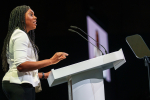With a change in leadership in the United States, Russia’s ongoing illegal invasion of Ukraine and the growing conflict in the Middle East, the NATO Parliamentary Assembly continues to provide the democratic underpinning of the wider NATO alliance.
Whilst in government, I had the honour to lead the UK’s delegation to the NATO assembly but, following the outcome of the UK general election, that duty now falls to a Labour Party, with whom I’m working to ensure a smooth transition. As convention dictates, I have been appointed by the House as deputy leader, representing HM Opposition at assembly meetings.
In December, the annual assembly meets in Montreal where I will be chairing a session on the final report of my tenure as chairman of the Defence and Security Committee. Last year we focussed extensively on the Russian threats to land, sea and air, which will form vital discussion tools for defence ministers across the alliance before the Heads of States meet at the NATO Summit. This is a key feature of the democratic underpinning, shaping NATO’s future from the Parliamentary Assembly up to the Head of States Summit.
Several bilateral conferences take place at the general assembly meeting, not least with Ukrainian colleagues, but also with our Georgian counterparts who face threats to territory at the hands of Putin’s mobilisation. Georgia’s status as partnership members of NATO provides a path to full membership, notwithstanding extensive work that is underway around the need to underpin democratic processes, ensure freedom of expression, and align with the values of the alliance. This is a long process as soft power negotiations move slowly along.
There will be more to report following the upcoming general assembly meeting.


